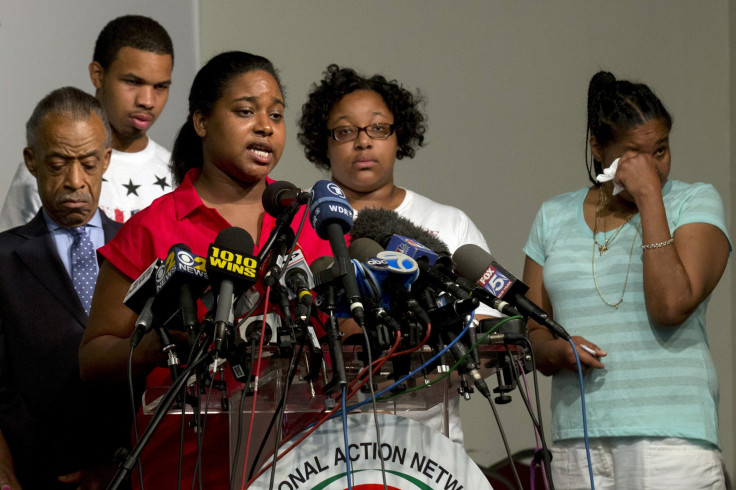Election 2016 Democratic Endorsements: Families Of Black People Killed By Police Offer Support Ahead Of Iowa Caucuses

The 2016 presidential election will be the first one held since the emergence of Black Lives Matter, a social justice movement sparked by a startling number of police-involved deaths of young African-American men and women in recent years. There’s a growing list of those touched by the most prominent cases in the last year who have gotten involved in the White House race.
Some of the victims’ families and their attorneys in cases out of New York and South Carolina have used their notoriety to weigh in on the Democratic primary, which is set to begin with the Iowa caucuses next week. On Friday, Erica Garner, daughter of Eric Garner, the 43-year-old black man who died after a New York City police officer placed him in a chokehold, announced that she was endorsing Vermont Sen. Bernie Sanders because of his plan to address “structural barriers” perpetuating police brutality against blacks.
“Who will address the criminalization of our people? Who will bring us closer to real safety, freedom and power? Who has clearly shown us where they stand?” Erica Garner wrote in a Sanders endorsement message circulated by the campaign and published by the Washington Post.
Following the 2014 shooting death of Michael Brown in Ferguson, Missouri, activists affiliated with the movement for black lives called on Democratic and Republican presidential candidates to outline policy positions on reform of the criminal justice system. While Democratic candidates pledged to make the system less disruptive and more accountable to people of color, Republicans have not been as open to the conversation. Even though Democrats appear to be leading on the issues, it’s unclear what kind of influence endorsements from victims’ families will have on race.
Garner, who related her father’s videotaped encounter with police in July of 2014 to the police involved deaths of Sandra Bland, Laquan McDonald and Tamir Rice, among others, said Sanders had begun work on reforming criminal justice system long before those cases made national news. The 74-year-old senator has called for federally funded body worn camera for U.S. police officers, demilitarization of police forces, bans on prisons for profits, among other proposal.
“[African-Americans need] someone who will speak out against the wars being waged against our communities. Not someone who only pays attention to our concerns when it’s time to collect our votes,” Garner wrote in an apparent dig to former Secretary of State Hillary Clinton, Sanders’ rival.
Clinton, 68, was recently criticized for changing her tune on criminal justice issues, as she had formerly supported law enforcement legislation enacted by her husband, former President Bill Clinton, which led to black men being imprisoned at rates disproportionate to the incarceration rate for white men. Last April, Clinton announced a platform that included body worn cameras for police officers and an end to mass incarcerations policies. The former first lady recently lost the support of an attorney for the family of Walter Scott, a 50-year-old black man shot in the back by a North Charleston, South Carolina, last April.
Justin Bamberg, the Scott family attorney who is also a state representative in South Carolina Legislature, said Monday that he had changed his mind about backing Clinton, after realizing he hadn’t given Sanders a fair chance. “I’ve always liked Bernie, even when I endorsed Hillary,” Bamberg told ThinkProgress. “When I say that I didn’t give Bernie Sanders his fair shake as a candidate, I mean that I did not take the time to listen and really look at what he was offering. One thing I really like about Bernie Sanders is that he’s not a status quo type of guy.”
Last fall, Sanders also gained the endorsement of prominent black intellectual and civil rights activist Cornel West. The former Princeton University professor, who aligned himself with the Black Lives Matter movement in response to the Ferguson case, has appeared on the campaign trail with Sanders.
Clinton does have the endorsement of Sybrina Fulton, mother of Trayvon Martin, the Florida teen shot to death in 2012 by George Zimmerman, who was acquitted of murder charges a year later. In early January, Fulton said she was backing Clinton because of her stance on gun control and gun violence. "With so many of our children's lives on the line or taken, we simply can't afford to elect a Republican who refuses to even acknowledge the problem of senseless gun violence, Fulton wrote in a CNN Opinion piece about her endorsement. “The rising generation of our young people need a president who will stand up to inaction from Republicans and indifference from the NRA. I believe that person is Hillary Clinton."
Democratic presidential candidate Martin O’Malley, who trails Clinton and Sanders in primary polling, has not garnered similar endorsements. As the former Maryland governor and former mayor of Baltimore, where the police-involved death of Freddie Gray sparked civil unrest, rioting and peaceful protests last April, O’Malley has also outlined a criminal justice platform that mirrors his opponents.
If any candidate is winning in the race for social justice endorsements, it is currently Sanders. “Black Americans — all Americans — need a leader with a record that speaks for itself,” Garner said of Sanders. “And to me, it’s clear. Of all the presidential candidates, Sen. Bernie Sanders is our strongest ally.”
© Copyright IBTimes 2025. All rights reserved.






















